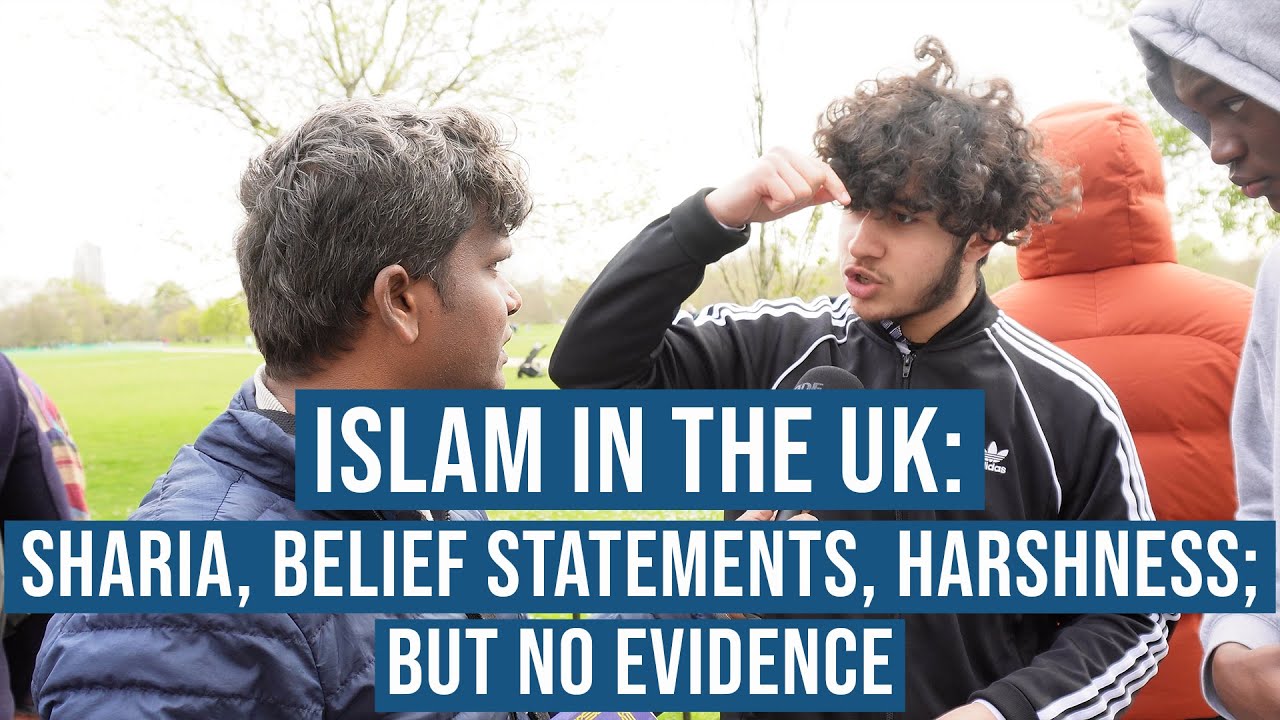GodLogic DOMINATES Top Muslim Preacher at Speakers Corner! MUST WATCH!
Summary
TLDRThe video script features a discussion at Speaker's Corner, where Avery, a Christian, explains why he rejects Islam, citing the lack of evidence in the Bible about a prophecy of Muhammad (referred to as 'Ahmad'). The Muslim interlocutor challenges Avery's knowledge of biblical texts and their authenticity. The debate centers on scriptural reliability, interpretations of Jesus' words, and the concept of divine prophecy. Despite interruptions and a tense exchange, the discussion highlights differing perspectives on religious texts and the criteria for their authenticity.
Takeaways
- 🤔 The debate centers around the reasons why Avery, a Christian, rejects Islam, focusing on his belief that Jesus did not mention a prophet named Ahmed as stated in the Quran.
- 📜 Avery emphasizes the importance of Jesus' words in Christianity and the lack of evidence in historical texts that Jesus mentioned Ahmed or another messenger to come after him.
- 🧐 The Muslim speaker challenges Avery's investigation methods, questioning the authenticity and reliability of the texts Avery references to support his claims.
- 📚 The discussion delves into different gospels and writings about Christ, both canonical and non-canonical, highlighting the complexity of determining the authenticity of historical religious texts.
- 🔍 The Muslim speaker argues that many texts and prophecies have been corrupted over centuries, suggesting that the original words of prophets, including references to future messengers, may have been lost or altered.
- 💬 Avery counters by stating that the Quran explicitly claims Jesus mentioned a messenger by name, and questions where this evidence can be found if historical documents have been corrupted.
- 🤷 The debate shifts towards the broader issue of how to verify the authenticity of religious claims and the texts that support them, with both sides questioning each other's criteria for reliability.
- 🔄 There is a recurring argument about whether the Quran or the Bible contains the true and unaltered words of Jesus, with both sides accusing each other of having corrupted scriptures.
- 🙌 The discussion highlights the fundamental differences between Christianity and Islam regarding the role and recognition of prophets after Jesus, particularly the claim of Muhammad as a prophet in Islam.
- 🚪 The debate concludes without a resolution, showcasing the deep-seated differences in belief and interpretation between the two participants, ultimately reflecting broader interfaith challenges.
Q & A
Why does Avery reject Islam?
-Avery rejects Islam primarily because, as a Christian, he finds no evidence in the historical texts he has studied that Jesus mentioned a messenger named Ahmad would come after him.
What specific claim in the Quran does Avery find problematic?
-Avery finds the claim in the Quran that Jesus mentioned a messenger named Ahmad would come after him problematic, as he sees no evidence of this claim in any historical texts he has studied.
How does Avery approach the investigation of religious claims?
-Avery approaches the investigation of religious claims as an investigator, trying to verify the truth of the claims by examining historical texts and evidence.
What is the significance of the mention of Jesus' prophecy in Avery's argument?
-The mention of Jesus' prophecy is significant in Avery's argument because he believes that if Jesus had mentioned a messenger named Ahmad, it would have been recorded in historical texts, and the absence of such a mention makes the Quran's claim false.
What sources does the other speaker refer to in the discussion?
-The other speaker refers to various gospels, including the Gospel of Thomas, the Gospel of Judas, the Gospel of Infancy, and the Gospel of Mary, as well as the writings of the New Testament.
How does Avery respond to the claim about the reliability of different gospels?
-Avery responds by emphasizing that he has investigated the texts, particularly the New Testament, and finds no evidence of Jesus mentioning a messenger named Ahmad.
What does the other speaker argue about the authenticity of religious texts?
-The other speaker argues that the authenticity and reliability of religious texts are important, and questions how Avery has established the authenticity of the texts he considers reliable.
How does Avery address the issue of textual corruption?
-Avery addresses the issue of textual corruption by acknowledging that he has looked into the historical texts and found no evidence supporting the Quran's claim about Jesus mentioning a messenger named Ahmad.
What is the other speaker's perspective on the prophecies in the Old Testament?
-The other speaker's perspective is that the Old Testament contains descriptions of the Messiah (Jesus) and that similar descriptions should be found for the prophet Muhammad, according to the Quran.
What is the significance of the debate about Jesus' words and their documentation?
-The significance of the debate about Jesus' words and their documentation lies in determining the authenticity of religious claims. If Jesus did mention a messenger named Ahmad, it would have been a significant prophecy, and its absence in historical texts challenges the Quran's claim.
Outlines

This section is available to paid users only. Please upgrade to access this part.
Upgrade NowMindmap

This section is available to paid users only. Please upgrade to access this part.
Upgrade NowKeywords

This section is available to paid users only. Please upgrade to access this part.
Upgrade NowHighlights

This section is available to paid users only. Please upgrade to access this part.
Upgrade NowTranscripts

This section is available to paid users only. Please upgrade to access this part.
Upgrade NowBrowse More Related Video

Kenapa Babi Haram di Islam ?! Dr. Zakir Naik

7 Prophecy Miracles Of Our Prophet (pbuh)! - Every One Of Them Became True!

Show me a prophecy of the prophet Mohammed! Ali and Christian Speaker's Corner

Muslims Begin with a Sharia Threat But End Up Clearing the Space When Challenged | Arul Velusamy

Proses Mendapatkan Izin Tinggal di Arab Saudi

Mana sebutan yang benar: Allah atau Elohim? Tuhan atau Yahweh/Yehowa? - Ps. Gerry Tengker
5.0 / 5 (0 votes)